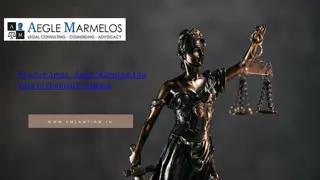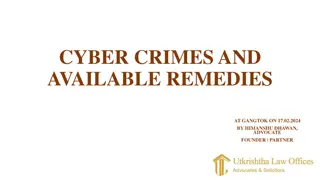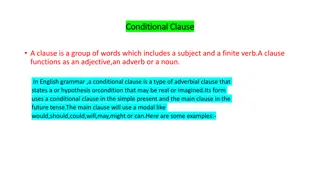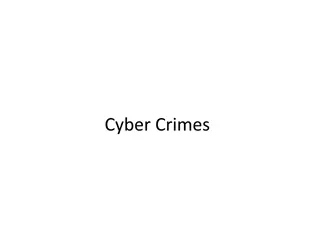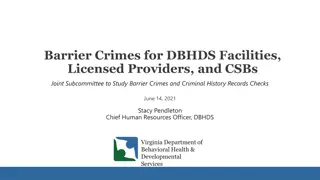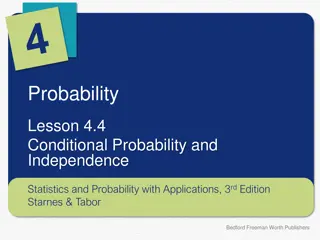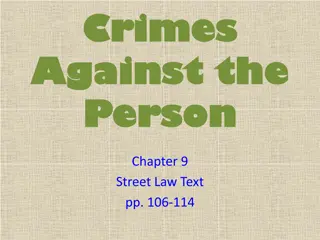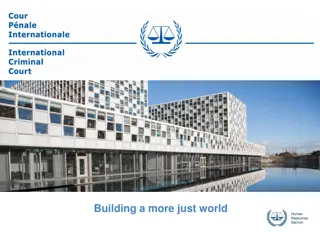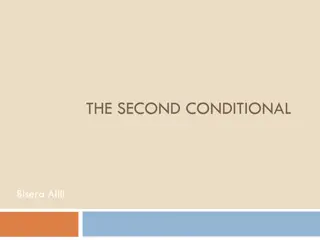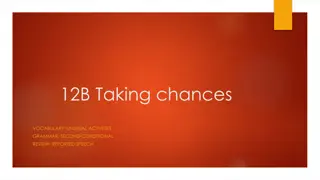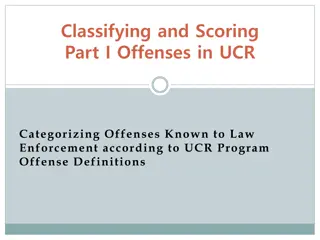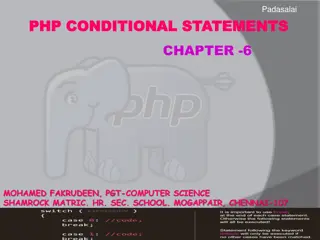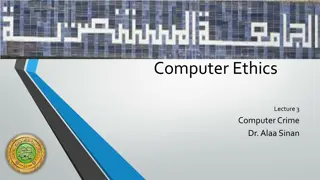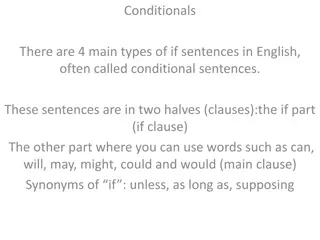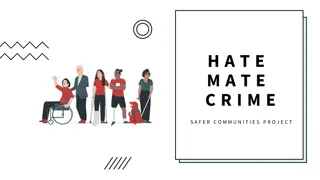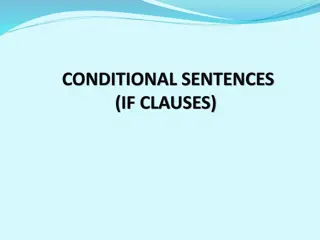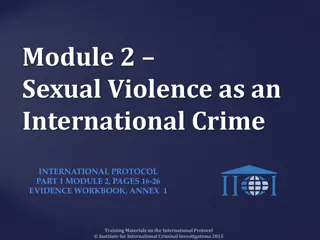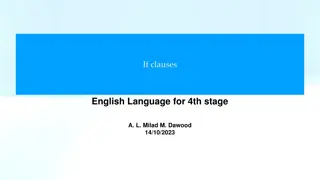Understanding Second Conditional and Vocabulary on Types of Crimes
Explore the concept of the second conditional for describing unreal or unlikely future events. Discover a variety of vocabulary related to different types of crimes, criminals, and crime verbs. Practice constructing sentences and learn alternatives for the word "if."
Download Presentation

Please find below an Image/Link to download the presentation.
The content on the website is provided AS IS for your information and personal use only. It may not be sold, licensed, or shared on other websites without obtaining consent from the author. Download presentation by click this link. If you encounter any issues during the download, it is possible that the publisher has removed the file from their server.
E N D
Presentation Transcript
Unit 3A Honesty Upper intermediate I Vocabulary Vocabulary types of crime , criminals and crime verbs Grammar Grammar second conditional; alternatives for if Review Reviewagreeing and disagreeing
Vocabulary Vocabulary - -Types of crime criminals and crime verbs Types of crime criminals and crime verbs Crime Crime Criminal Criminal Verb Verb robbery robber Rob theft thief steal terrorism terrorist ------------- burglary burglar burgle mugging mugger mug shoplifting shoplifter shoplift smuggling smuggle smuggle kidnapping kidnapper kidnap fraud fraudster fraudster bribery -------------------- bribe murder murderer murder arson arsonist ------------------------- vandalism vandal vandalise looting looter loot
Please, take a look at the new vocabulary connected to a types of crimes: Please, take a look at the new vocabulary connected to a types of crimes: Try to compose your own sentences using vocabulary on the left: E.g. *He`s just burgled a house and stolen a DVD player. *The police are treating the fire as arson. *Last summer`s riots saw thousands of businesses ransacked by looters. * * * * * Read the questionnaire on page 22. student`s book and choose the best answer for you.
Grammar Second Conditional What is the second conditional? The second conditional, also sometimes called type two conditionals, is a structure to describe unreal or unlikely events in the future. For example: If I won the lottery, I would give some money to charity. If he went to class more often, he would pass the tests. What is the sentence structure? The second conditional consist of two clauses, an if-clause and a main clause. IF-CLAUSE: If | subject + past tense verb , MAIN CLAUSE: subject + would + main verb + object/complement Put the if-clause and the main clause together, and you have a second conditional sentence. Notice there is a comma between the IF-CLAUSE and MAIN CLAUSE: If Kate won the lottery, she would quit her job. If he went to class more often, he would pass the tests. The clauses may be inverted (MAIN CLAUSE + IF-CLAUSE). There is no comma then. For example: Kate would quit her job if she won the lottery. He would pass the tests if he went to class more often.
Other modals may be used instead of would. In particular, could, might, and should may be used, which adds an element of speculation or possibility to the sentences. If the US attacked Russia, it might be the end of the world. If I quit my job, I could travel around the world. In addition, the simple past of be is always were when using the second conditional. For example: O If I were rich, I would own fifty-two cars. I would drive a different car each week! X If I was rich, I would own fifty-two cars. Alternatives for IF Alternatives for IF There are several alternatives for if: assuming , as long as , provided (providing) , suppose (supposing), There are several alternatives for if: assuming , as long as , provided (providing) , suppose (supposing), imagine, even if . imagine, even if . * Provided and as long as mean only if this happens * Provided and as long as mean only if this happens * Assuming means accepting that something is true * Assuming means accepting that something is true * Imagine and suppose have the same meaning, and we use them as alternative for if in questions * Imagine and suppose have the same meaning, and we use them as alternative for if in questions Having read all these rules, could you please do exercises 4. and 5. Student s book , as well as workbook pp.15. and 16. ex. 3. and 4. For more exercises, please visit the following link https://www.e-grammar.org/conditional-2- exercises-pdf/
Thank You for your attention! Stay foolish, stay young! but most importantly these days STAY HEALTHY, STAY HOME! Lecturer Dragana Radinovic
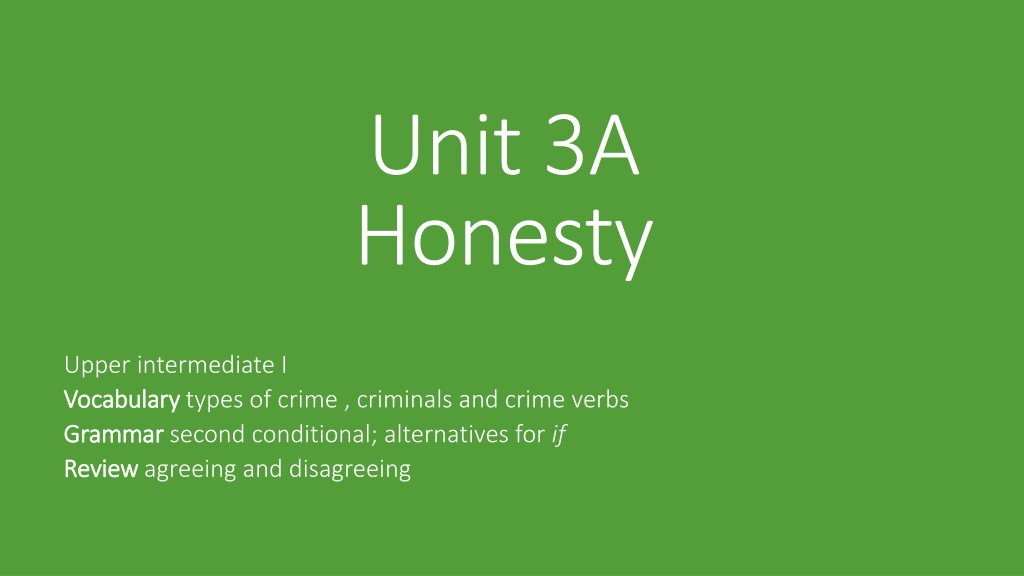

![Prevention and Combating of Hate Crimes and Hate Speech Bill [B.9B.2018]](/thumb/60513/prevention-and-combating-of-hate-crimes-and-hate-speech-bill-b-9b-2018.jpg)
